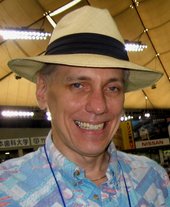
THE HOT CORNER: More to game than just winning

THE HOT CORNER: More to game than just winning
by Jim Allen (Jan 7, 2010)
About this time last year, fans were encouraged by Nippon Professional Baseball's campaign to speed up its games under the catch phrase: "Let's sho time"--with sho being a kanji character meaning to conserve or reduce. Although several minutes had been shaved off game times in 2008, the results this past season were more modest.
An average half-inning took 10 fewer seconds in 2009 than the year before, resulting in games being about 1 minute 46 seconds faster. Try building an ad campaign around that.
Last season, a timer was displayed on scoreboards around the country to show how long teams took to change sides and bring in new pitchers. But no matter how many things they decide to time, nothing is going to change substantially because the inmates are running the asylum.
The commissioner, ostensibly in charge of quality control, is powerless to act without the owners' consent. And the owners have shown little inclination to protect fans from deadly-dull tactics that have hijacked the game in the name of competition.
Despite a "game" weighed down by endless full counts, excruciatingly dull sequences of pickoff throws, meaningless mound conferences and parades of pitchers coming into face one batter each, owners and league officials have done little but say, "Let's hurry up."
Hall of Famer Katsuya Nomura epitomized this predicament when he complained about the PL policy of reaching out to fans by announcing starting pitchers in advance.
"If you're fighting a war, you don't announce when you're launching your missles, do you?" Nomura asked after taking over the Tohoku Rakuten Golden Eagles in 2006.
Announcing starting pitchers in the PL is a rare concession to the fans made at the expense of unbridled competition. It's no surprise the more conservative Central League refuses to follow suit--even when playing interleague games in PL parks.
Until owners realize their product can be about more than just winning, games are not going to be any livelier or appreciably shorter.
But even if the big bosses haven't realized their customers deserve higher quality baseball, they at least have decided to give fans more in the stands.
Since the fans supported the 2004 players strike, teams have bent over backwards to provide "fan service." Taking a page out of Major League Baseball's book, the clubs have gradually upgraded their parks and services.
The Eagles, born as a result of 2004's unrest, created a cozy park that is one of the top baseball experiences in the world. Other teams rushed to mimic the field seating that is integral to Sendai's stadium, with Tokyo Dome, Fukuoka Dome, Chiba Marine Stadium, Sapporo Dome and Seibu Dome all adding seats closer to the action.
It's a small thing, but sometimes a slight change in perspective can make a big difference in the way we see things.
Take the Hiroshima Carp for example. For years, much of what people thought about the team was shaped by their playing in Japan's best home run park.
The much-larger Carp park that opened last season dramatically altered the baseball balance of power in the City of Peace. Without cheap home runs, Hiroshima's offensive failings were exposed.
Hitters floundered while pitchers flourished in Japan's second toughest home run park. Kenta Kurihara, the cleanup Carp, hit 23 home runs, the same as he had the year before. Unfortunately, he flushed his batting average down the toilet in the process. The pitchers, meanwhile, posted a 3.59 team ERA, the Carp's best since 1995.
The club finished fifth, however, and manager Marty Brown, who made the Carp younger and more competitive while playing the fastest games in Japan, was gone.
Hiroshima's loss, however, is Sendai's gain, now that Brown has moved north to replace Nomura on the Eagles bench. The old warrior took the team into the playoffs last autumn, changing the perception that Rakuten's young franchise would not be competitive for years.
On the other hand, Nomura's managed the slowest games in the country. Japanese baseball talks about fast and exciting games; Sendai is going to get the real deal.
Let's hope the Rakuten fans learn to appreciate it.
To access the original work (if still available), please reference:
http://www.yomiuri.co.jp/dy/sports/20100107TDY20305.htm.
Back to the works of Jim Allen
This work is licensed under a Creative Commons License.
Some rights reserved.
